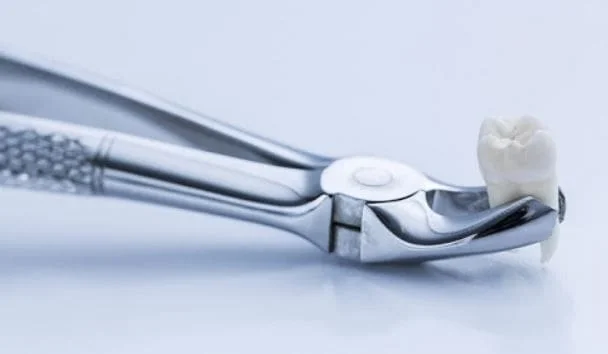Reasons for Surgical Extractions
By taking an x-ray and examining your tooth, your dentist can usually determine whether or not your extraction will be simple or surgical. But there are times when a simple extraction turns into a surgical. If a tooth breaks off during the procedure, for instance, it may need to be taken out in pieces.
Wisdom teeth often face surgical extraction because they're usually impacted, meaning they are not completely erupted into the mouth. This condition requires cutting through bone and tissue. Removing severely broken down teeth, root tips or teeth with long-curved roots are other examples of surgical extractions. Then there are times when the bone around a tooth has become dense, resulting in the need for surgical treatment.
With surgical extractions, you'll most likely have one or more stitches at the extraction site. Regardless of whether your extraction is simple or surgical, it's always important to closely follow your dentist's after-care instructions to speed recovery and avoid any complications.
After Tooth Extraction
After tooth extraction, it’s important for a blood clot to form to stop the bleeding and begin the healing process. Bite on a gauze pad for 30-45 minutes immediately after the appointment. If the bleeding or oozing still persists, place another gauze pad and bite firmly for another 30 minutes. You may have to do this several times to staunch the flow of blood.
After the blood clot forms it is important to not disturb or dislodge the clot. Do not rinse vigorously, suck on straws, smoke, drink alcohol or brush teeth next to the extraction site for 72 hours. These activities may dislodge or dissolve the clot and hinder the healing process. Limit vigorous exercise for the next 24 hours, as this increases blood pressure and may cause more bleeding from the extraction site.
After the tooth is extracted you may feel some pain and experience some swelling. An ice pack or an unopened bag of frozen peas or corn applied to the area will keep swelling to a minimum. Take pain medications as prescribed. The swelling usually subsides after 48 hours.
Use pain medication as directed. Call our office if the medication doesn’t seem to be working. If antibiotics are prescribed, continue to take them for the indicated length of time even if signs and symptoms of infection are gone. Drink lots of fluids and eat nutritious, soft food on the day of the extraction. You can eat normally as soon as you are comfortable.
It is important to resume your normal dental routine after 24 hours. This should include brushing and flossing your teeth at least once a day. This will speed healing and help keep your mouth fresh and clean.
If you have heavy bleeding, severe pain, continued swelling for 2-3 days, or a reaction to the medication, call our office immediately at 610-325-1670.

